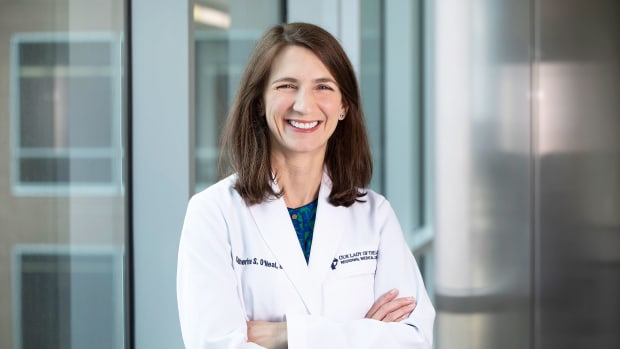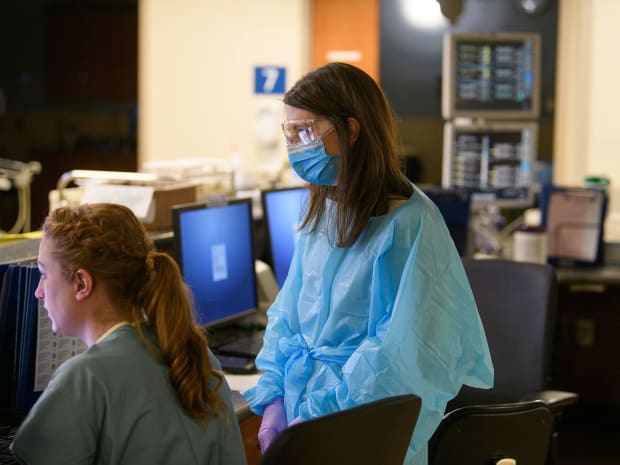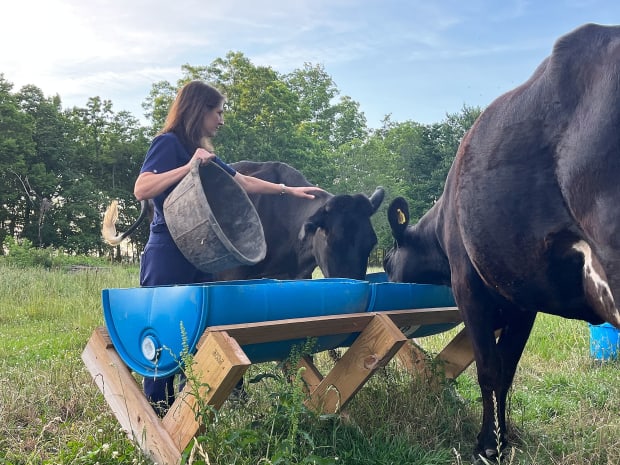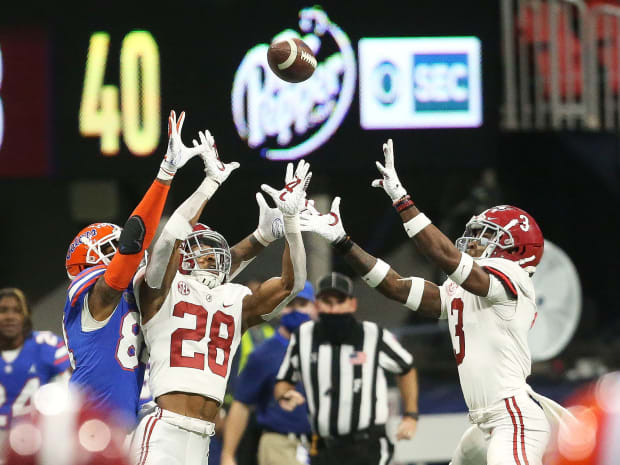Katie O’Neal is fine with being called a farmer’s daughter.
She refers to herself as such, even though she is a farmer herself now. Her father, Ted Smith, grew rice and soy beans in a tiny Cajun town in southern Louisiana. Now, his second of four daughters culls a 56-acre property nestled between a bayou named Elbow and a river named Mississippi off a road named River.
Katie and her husband, Bud, have five cows, 25 chickens, an orchard of fruit trees, a blossoming garden and a few pesky wild foxes that have literally found the hen house (don’t worry, Katie’s on the case). Their farming tools, three tractors among them, are strewn within a giant red barn situated behind a palatial brick home. Around a swimming pool and outdoor kitchen, two dogs, three cats and three children lounge on the cool patio.
There’s a pond, too, filled with brim and bass, an herb garden, dozens of pecan trees and a sad-looking rosemary bush that Katie trimmed too much for Bud’s liking. “He’s mad about it,” she says with a laugh. O’Neal’s home is a serene respite from her day job as one of the United States’s leading infectious disease doctors and chief medical officer of a metropolitan hospital in Baton Rouge.

Marie Constantin
For some, Katie O’Neal has a far more important distinction. During the first pandemic in a century, she was one of the country’s most vocal proponents of the COVID-19 vaccine and safeguards around the virus.
Her stance was at times attacked by people who chose to believe in conspiracy theories over scientific data. To some of her own acquaintances and neighbors, O’Neal was a villain, someone who restricted freedom, perpetuated lies and fear. But what those detractors might not have realized was that she also privately fought for what many of them yearned for: the return of college football.
In the summer of 2020, she was the unofficial chair of the SEC’s COVID-19 task force and commissioner Greg Sankey’s top medical adviser, maneuvering the conference through countless landmines and preaching patience when other leagues bailed on having a season. In doing so, some might say she saved college football and prevented a domino effect of decisions that may have cratered the sport for years.
Almost two years since that summer, O'Neal has been hired as the SEC's chief medical adviser. She now cracks open the barn door on the past two years of her life.
“I never knew the SEC decision would carry so much weight,” she says. “Was it the right thing to do, play football? Everybody questions decisions. I question my own. Sometimes we are wrong. We were lucky.”
Bud, also a physician, interjects: “You weren’t lucky. You were right.”

Courtesy of Katie O’Neal
On the first floor of Our Lady of the Lake Regional Medical Center, off a courtyard filled with banana trees and about six miles west of LSU’s Tiger Stadium, Katie O’Neal speaks from a clean, simple office bathed in white. A framed picture of Mother Teresa hangs on her wall. A signed LSU volleyball rests on her top-most cabinet, a nod to her alma mater. A silver cowbell, a gift from the folks at Mississippi State, sits beside it.
On the floor, oddly out of place, is a stack of empty egg cartons.
“I have chickens,” she blurts out with a laugh.
These four items encapsulate who Dr. O’Neal is—a healer from SEC country and farmer who often delivers fresh eggs to co-workers. She is a mother of two girls, ages 13 and 16, and a 10-year-old boy, as well as a wife to an ICU doctor (she met Bud in medical school). And, at age 45, she is also the chief medical officer of one of Louisiana’s largest healthcare systems in addition to her new SEC job.
In a new role born out of the pandemic, O’Neal will be responsible for organizing a standard level of care across a conference whose sprawling footprint will soon cover 12 states and 16 schools with the addition of Texas and Oklahoma. She will bridge healthcare practices among a diverse group of programs to avoid something COVID-19 exposed: a fractured implementation of medical care and protocols within the league.
O’Neal will operate in this new role from Baton Rouge and continue as OLOL’s chief, though her duties will be split with others to give her time to tackle SEC affairs. She says her top priority is clear: teach college athletes how to live a healthy life. “We have two to four years with them to do it. It’s a chance to teach kids in their 20s about healthy living. We saw people die during COVID because they were not healthy.”
An outspoken and influential member of the SEC’s COVID-19 task force, she helped guide the league through a pandemic that may finally be subsiding. The SEC disbanded its task force earlier this month in a sign of a further return to normalcy.
O’Neal was an outsider among the group of mostly team doctors, school trainers and sports medicine directors, many of whom already knew one another before joining the task force because of their work in athletics. O’Neal was distant enough from sports that she never really understood football practice habits until spending a day at LSU’s football operations building.
“I had her come in to understand what football practice looks like,” says Jack Marucci, LSU’s longtime athletic trainer who is now director of performance innovation. “She learned how they interact. I think that opened her eyes.”
Combined with the fact that she presided over a major hospital that at times was full of COVID-19 patients, she knew the disease, how to combat it and how the league could play a football season despite it. And given that her colleagues say she is the rare doctor with the ability to communicate in understandable ways, the conference thrust her onto the public stage as its COVID-19 spokesperson.
“She was the foundation and the rock that we built upon in terms of a strategy for athletes to play during COVID,” says Chris Klenck, the head team physician at Tennessee.
Privately, she evolved into the conference’s go-to source for questions and problems.
Did you have an issue with a coach? Call Katie.
Concern with a player? Text Katie.
Confused about a policy? Call and text Katie.
She found herself on Zoom calls with a cross-armed, steely eyed Nick Saban (the Alabama coach once grilled her about why COVID-19 isolation protocols were so long). She texted regularly with Sankey, advising him on significant decisions—for example, while other leagues used antigen testing, O’Neal refused, saying at the time they were too inaccurate.
The biggest decision of whether to play a 2020 football season seemed to rest on her shoulders, even if no one said it aloud.
She had her doubts, only revealing them to Bud. “We’re not going to play football,” she’d tell him over and over, as if speaking it into the air would prepare her for the worst. She hid her opinion well until one specific task force Zoom call. O’Neal had just watched the death of a young mother who had contracted the virus while driving her sons and their friends to a youth baseball game.
Frustration set in. Exhaustion took over.
While on camera in the middle of the meeting, she leaned back in her chair, covered her face with her hands and muffled, “I don’t know that we can play.”
There was alarm among the group. Did Katie just say we can’t play!? People were dying around her. Tests and personal protective equipment were in short supply. Hospitals were running out of beds.
“And here I am,” she recalls, “making decisions on football. I wanted to play football. I wanted the distraction.”

Ross Dellenger/Sports Illustrated
Katie O’Neal is small-town Cajun and proud of it.
She’s from Vidrine, a place with one blinking red light. Her graduating high school class was 18 people. She makes jelly from Louisiana’s mayhaw fruit tree and blackberry jam from her garden plants, and you should see the looks she gets each year when she walks into the post office to pick up a crate of clucking chickens from behind the counter.
She and Bud host a crawfish boil each year, and her mother, Mary, still speaks Cajun French. Each spring, not far from her hometown, men in colorful costumes trudge through muddy fields chasing a live chicken in Courir de Mardi Gras, the obscure and rural version of the booze-fueled festival that plays out three hours away in New Orleans. The chicken run makes Katie scowl. Women are not allowed to participate in this bizarre tradition. Katie is small in stature and tall in passion. She embraces her competitive nature and is not one to be trifled with.
Recently, at an auction fundraiser for a local children’s hospital, Katie found herself locked in a bidding war with a wealthy Baton Rouge businessman. The item for auction: a home-cooked meal by one of Baton Rouge’s best Cajun chefs. The price kept ticking up. It went from $4,000 to $5,000 to $6,000. The man approached Katie.
“Are you going to continue to bid against me?” asked Brian Kelly, the LSU football coach who recently signed a $100 million contract.
Her new role with the SEC is the latest rung in her meteoric rise in the medical world. She took over as OLOL’s chief two weeks before the pandemic arrived in the U.S. It’s been a chaotic two years, from a local infectious disease doctor to top medical official of the most powerful league in college football. In between, there was the loss of many patients, including a group she calls “the first 23,” a reference to OLOL’s first 23 COVID-19 patients who were each immediately intubated when they arrived at the hospital and later died. She still keeps a list of their names nearby. There was a six-week stretch at the start of the pandemic when the O’Neal children were sent to live with grandma while Katie and Bud spent 18 hours a day at the hospital. There was then a car accident she survived last June, one that left her with a broken sternum and a cracked wrist after her vehicle was totaled and turned upside down in a ditch.
There were countless television and radio appearances in an attempt to convince the naysayers to get vaccinated—a media blitz that unintentionally transformed her into the South’s version of Dr. Anthony Fauci. Her face, voice and name became synonymous with one word: vaccination.
There was the viral video of her on a pulpit at the Louisiana state capitol building warning the public that “if you don’t choose the vaccine, you’re choosing death.” There were the death threats that followed, some so serious the hospital staff asked whether she kept a gun in her home for protection. Finally, there were uncomfortable conversations with her children, one of which happened last year when her youngest child’s classmate told him, “My dad doesn’t like your mom.”
O’Neal politely requested that this story not mention the names of her children. “I don’t think it’s right that my kids have to answer for my problems,” she says.
There are positive outcomes, as well. Like the woman at Walgreens who recognized O’Neal as the “lady from TV,” she told the doctor. “You convinced my whole family to get the shot.”
More than a dozen Mississippi State football players lined up to get the shot after O’Neal spoke to them about vaccination. Similar events happened at LSU, Tennessee, Ole Miss and other places around the conference.
“It was hard to combat the misinformation put out there,” Klenck says. “Some of our athletes looked at YouTube videos. We are right here and they are listening to people on YouTube versus those who have a vested interest in their well-being.”
When O’Neal appeared on national or regional television, local healthcare authorities in Baton Rouge saw a spike in vaccinations, so she kept doing it.
“I admired her guts and her strength,” says Joseph Kanter, the top medical official at the Louisiana Department of Health. “Attempting to communicate science in this pandemic was oftentimes a contact sport. It was contentious. There were individuals with agendas. She had the guts to weather all of that.”
The comments got harsh. The personal attacks got bitter.
She stopped using Twitter, while Bud stayed off the LSU fan message board TigerDroppings, where anti-vaccination supporters created dirty memes of her and left nasty messages. She would occasionally receive texts from friends, “We’re thinking of you! Keep doing great things!” and she’d know what that meant: Twitter or TigerDroppings was buzzing about Katie.
“It’s unfortunate that a medical doctor would be the target of such hatred,” says John Bel Edwards, the second-term Louisiana governor who worked closely with O’Neal during the pandemic. “It’s really a sad commentary on where we are as a society, both here in Louisiana and around the country.”
O’Neal says she isn’t angry, but “feels bad” when rehashing her viral vaccine-or-death comment. “I still see people bringing it up on Twitter, but I wanted to convince people. They said, ‘At a certain point if you hadn’t gotten the vaccine, you weren’t going to get it.’ I didn’t believe that. People could still be convinced.”
“In the end,” says Klenck, “for those who listened, she probably saved a lot of peoples’ lives.”

Gary Cosby/USA TODAY Sports
Charlie Hussey learned of Katie O’Neal’s farming exploits in the oddest of ways.
During one of the COVID-19 task force Zoom calls, the SEC deputy commissioner noticed the darkened shape of O’Neal rooting around in her backyard. What ever was she doing?, Hussey wondered while seeing her on screen.
“Guys,” he recalls her saying, “my cow has escaped the pasture!”
O’Neal finally found Nora, then a new calf. She was able to turn back to more important matters, such as solving college football’s quandary to play or not. As the Pac-12, Big Ten, MAC and Mountain West canceled their fall seasons in July and August 2020, many looked to the SEC’s decision to chart its course. Pressure was high. Tension mounted. Doubts rose.
O’Neal wasn’t the only one to fear the league would shut down.
“[A school president] asked what may happen and I said, ‘Here’s where [other conferences] are heading,’” Sankey said in an interview with Sports Illustrated last year. “As I looked at the scope, the observation I made was, ‘I don’t know what the answer is and I don’t even know how to ask the question, but are we ready to cancel the football season?’ I said that honestly.”
The Mountain West and Pac-12 decisions made some sense because of government regulations and restrictions within their teams’ states, while the Big Ten’s decision left those within the SEC somewhat bewildered. “The decision right then and there,” then Georgia athletic director Greg McGarity says, “we didn’t understand that.”
The Big Ten’s primary concerns surrounded COVID-19-related heart issues in athletes, particularly cases of myocarditis. However, team physicians had seen myocarditis in athletes for years before the pandemic. (Bud says myocarditis is a side effect of many viruses, including the flu.) The SEC kept delaying its decision, pushing back the start of its season by nearly a month, a key move that allowed testing equipment to become more available at local hospitals. That opened the door to play, Katie says. The supply was there, and the risk wasn’t so high.
Athletes were somewhat separated from the rest of the community, were regularly tested and had elite medical care. “It was everybody else that was more at risk,” O’Neal says.
That is something hard to stomach to this day. “Everybody else in the world,” she pauses, “they could never have afforded the testing.”
She feels somewhat vindicated in the task force’s recommendation to play. The SEC completed 69 of 71 scheduled games. And since that 2020 season, two medical studies have justified the move. One found zero in-game transmission of COVID-19 in SEC games, while another stated participation in college athletics was not associated with an increased COVID-19 positivity rate compared to the general student body.
“Commissioner Sankey led us well through COVID and led college athletics through COVID,” says Georgia university president Jere Morehead. “He relied on good information and that was what was so great about Katie—she’s giving you great information and is not afraid to tell you what she believes. Our decision set the pace for the other conferences. I don’t think we could have made those decisions without an expert like Katie O’Neal.”
Back at home, the farmer’s daughter is touring a guest around the property and reminiscing about the last two years of her life. While daily deaths are the lowest since the pandemic began, the COVID-19 death toll in the U.S. recently hit 1 million people, more than 17,000 of those from O’Neal’s home state. About 33% of the U.S. population remains unvaccinated. In Louisiana, that number is 47%. In a February statement released by the CDC, unvaccinated people were 97 times more likely to die from COVID-19 than those vaccinated with a third-shot booster.
O’Neal says it has taught her how little baseline medical knowledge the general population has: “Everybody thinks they are medical experts because they can give opinions on social media.”
When she is overwhelmed, she comes to her farm—her happy place.
Striding across the grass, O’Neal turns a corner and pokes her head into the barn, grabs a giant bowl of feed and heads toward the pasture. Rosebud and Cocoa, her two adult cows, and calves Hope and Faith jiggle their way toward the doctor. The adults aren’t shy, diving their noses into the bowl while it’s still in Katie’s arms.
“I am a farmer’s daughter [first],” she says. And a doctor on the side.







